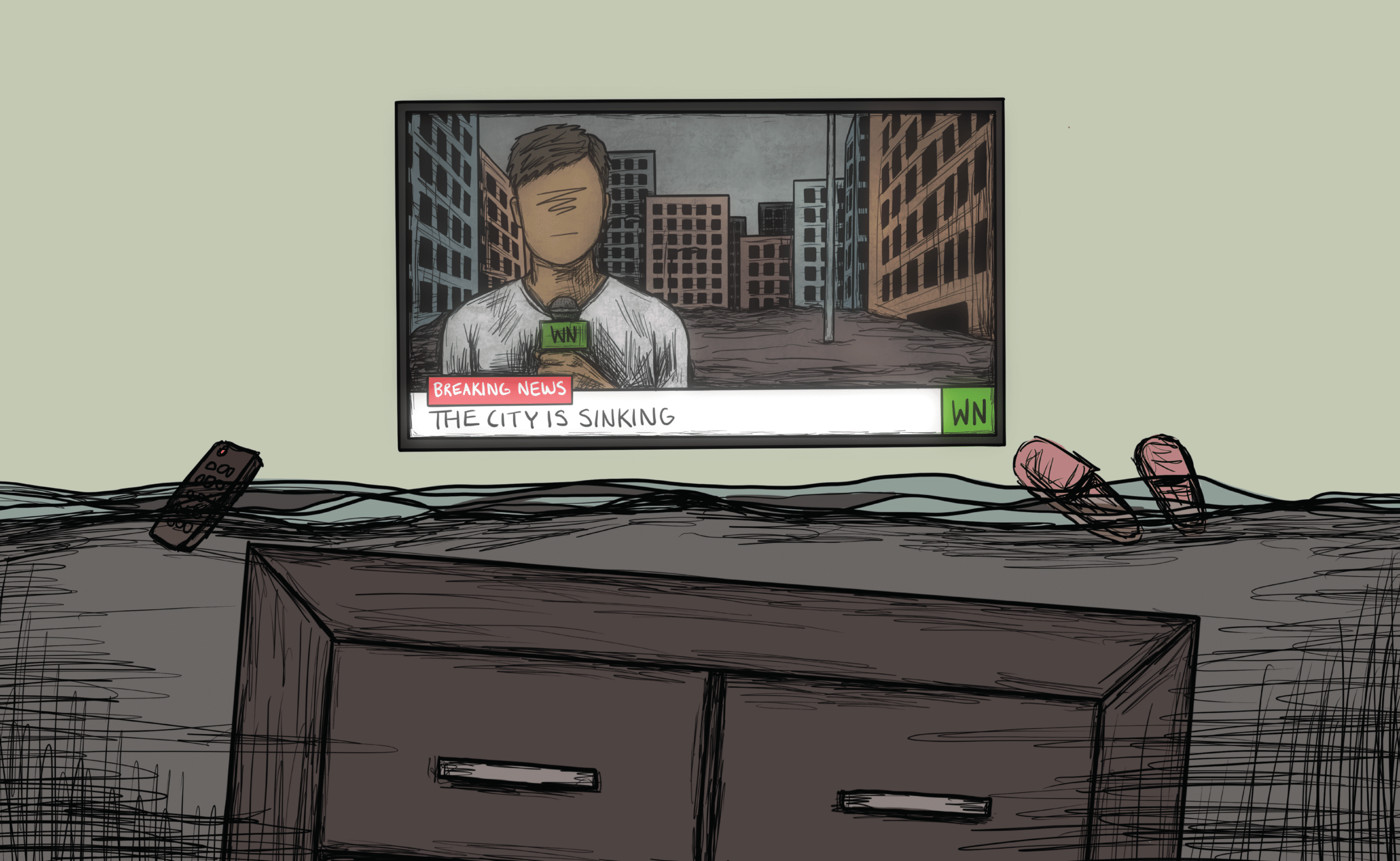Drowning Soft and Slow—Reflections at the End of the World
The city is sinking.
The words would’ve frightened them, had they not been drowning long before the water rose. Three pairs of eyes were stuck to the screen broadcasting their doom; not glued there, but resting on it, as they had been for years. The words should have set their minds racing.
But the man, the woman, and the daughter’s thoughts drifted from the screen to the cool draught from the cracked windowpanes and back to the screen.
Adorable, all three of them thought. Sweet that they think we should care now. Decades ago, in the early days of the warming, everyone had cared: the people, because of the warmth clouding the air; their leaders, because of the people crowding the streets. So, papers were signed, and promises made, if only to keep the clamour off the roads.
But the air had stayed clouded, and when lungs began at last to be stifled by the heat and claimed by the floods, breathing became a chore, and clamouring impossible. The people grew weak; the wealth did not. Life on the aircrafts and along the oil pipelines went on, leaving the humans behind to wheeze. It was just a global phenomenon now, not a tragedy—their deaths were mere side effects.
The man, the woman, and the daughter read the broadcast like the closing line of a bedtime story.
The city is sinking.
Around them, the waves lapped soft and slow like a lullaby.
We’re going under—at some point in the past few years, it had become a prediction, no longer a plea. And right now, it was nothing more than an observation. Today’s forecast? Clear skies, some mist, apocalyptic flooding. By the time the screen had drained their attention, the water was a foot high along their house’s base.
This is it, the man thought. He didn’t feel very afraid. He hadn’t felt much of anything for years. At times he missed the drive that feelings had once given him. Feelings were the engine to his narrative; without them he’d become stagnant. Unharmed—ever his goal—but unmoving.
Looking back at his life, he didn’t see a story. He saw a painting; a stilted family portrait of three blank faces. One was his own. The next was the woman now beside him. In his painting she was smooth, untarnished, and unblinking. But if you looked close at the real her, lines claimed the space between her eyes. One might have mistaken them for worry, but they were confusion.
It’s happening at last. Her mind only scanned the words, not letting them sink in. The lines between her eyes deepened.
She’d heard speculations of what these final moments would be like. It’ll all go down quick, they’d assured her. Blink and you’ll miss it. But this was nothing more than a crawl—living was the part that had been too fast.
This wasn’t like boarding a train and it wasn’t much like seeing the light at the end of a tunnel either. It was more of a wandering, really. She shuffled from one moment to the next—memories she’d cherished, and faces she’d forgotten to. A thousand little steps, bit by bit in her mind, each in time with the droplets pooling onto the house floor.
The water had reached the cracked windowpanes now.
The final blank face in the man’s family portrait was the daughter’s. She’d thought of this moment a thousand times as a child, of facing it with planted feet and a firm gaze; steady and grown up at last. But growing up had turned out to just be an event, not an action. It wasn’t something she could do, it just happened—and left her behind to stumble in the dark and damp that was overtaking her home.
Ever since she was small, the screens had been her comfort. The screens offered answers in the form of rousing recorded speeches and reminders to appreciate every moment. By the time she looked away from them, the moments had passed, and in turning back, she missed seeing the last of the birds spread its wings to find lush land and cool air that didn’t exist anymore. Live your life, they’d told her from the screen, so she’d lived her life on it. Two blue-lit dimensions gnawed away at the young mind through the eyes it had claimed so easily.
When the water hit the ceiling, the broadcast was still playing, and the daughter’s eyes were still stuck to it.
It didn’t stop at their ceiling. Mere days later, even the skyscrapers weren’t granted the grace of breaking the surface. But looking down from above, you could see no bodies. After decades of broken promises, the people had demanded one final consolation: to drown in the comfort of their own homes. They rest there still, away from the surface.
They rest there.
Still.
Look to the horizon. Look to where the sky meets the water.
For the people in the city, that meeting place is just up—there is no forward anymore.
But from above, you can listen to the lapping waves. Soft and slow like a lullaby. Listen to how gently the current flows. Notice how peacefully it drowns the earth.
Can you hear the breeze?

